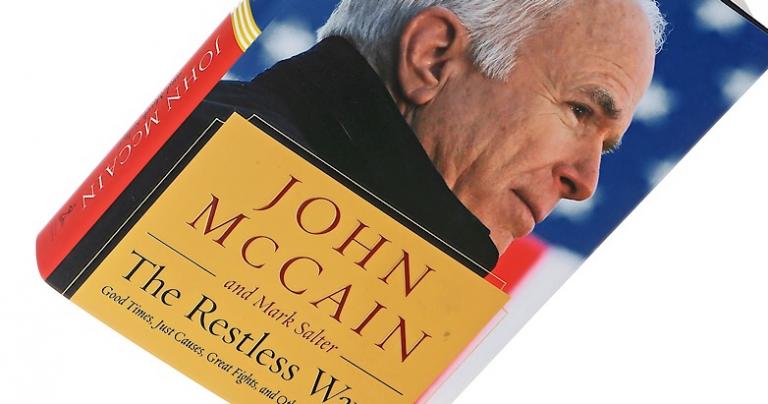
I have come to praise John McCain, not to condemn him. May God grant him many years. Yet his book, The Restless Wave, is sad, mostly because the “good times, just causes, great fights” seem ancient history already. The valedictory is bitter while intending to be optimistic: scores settled with forced cheer.
McCain helped win a Cold War and salvaged a misguided hot one. He says he had a good time. If so, it was long ago. There is nothing to cheer here, only some good that is based on what was.
John McCain seemed born for greatness. He was a man of great personal courage and endurance, but he kept missing the mark. He was episodically great: as a prisoner in Vietnam, as an opponent of torture in our military, supporting the Surge when it was unpopular, admitting his mistakes.
Twixt moments of moral clarity, McCain remained captive to the conventional wisdom of any particular decade in his life. His maverick moments were to lurch from some Republican conventional wisdom to Democratic norms.
If you colored in the lines of the establishment of either party, McCain forgave and forgot. His great virtue is fighting hard, even getting angry with his opponents, and then moving on to get the job done.
His memories betray an inability to think outside the World War II consensus his father’s generation built.
Clinton, Kennedy, Reagan, and the Bush family bought and defended that consensus and so McCain could work with them. Where that consensus remains good and vibrant, this makes McCain the noblest Washingtonian of them all. Where that established wisdom was and is evil and out of date, McCain does not change.
The Restless Wave shows that the evil a maverick does lives with him.
To his credit, Senator McCain admits he was wrong to press for war against Saddam Hussein, but the problems in the Middle East remain. Those of us who trusted him and supported the war were wrong, too, but we hope to learn from our mistakes. McCain presses on and Egypt, Libya, Syria all call for the same range of solutions.
We must not forget that a young McCain went to his nation’s wars and suffered horribly in the hands of tormentors. Whatever else this taught him, McCain learned what governments could do to men. He opposed torture his entire career—a noble cause, one that few defend, especially in wartime.
The chapter About Us is honest and in a book prone to repeat and ramble, straightforward and concise. McCain blends stories of torture, his own experience, and data to call us to our better selves as Americans.
Reporters knew McCain was ambitious for media praise. It was a grievous fault, and grievously did he pay for it as the Republican nominee. The reporters turned on him and buried his hopes.
John McCain’s strength is his weakness: his rage does not last with mainstream people, his people. When the campaign was over, he went back on Meet the Press, chatted with the Washington Post. He suffered some harm, but no foul. Forgiveness is good, but McCain’s inclusive circle began to look like the rich and privileged of an ancient regime.
The Restless Wave defends a consensus that no longer exists and should no longer exist.
The politics of the World War II consensus are dead: Democratic and Republican. This book relates stories from the Arab Spring—Obama, Clinton, McCain and Lindsey Graham travel the world arguing within a spectrum of choices of what America should do. Ike’s Crusade in Europe is as relevant and about greater times.
As we shift from a post-War world, what should America do? We should look to Senator McCain’s strengths. We should work together when we can for the common good, fight for human rights, and do our duty as God gives us to see our duty.
John McCain did his duty, often heroically, as he was taught. He does his duty still, even when he is mistaken. In the end, John McCain, for all his flaws, is a patriot and an honorable man.
Rachel Motte edited this essay.











